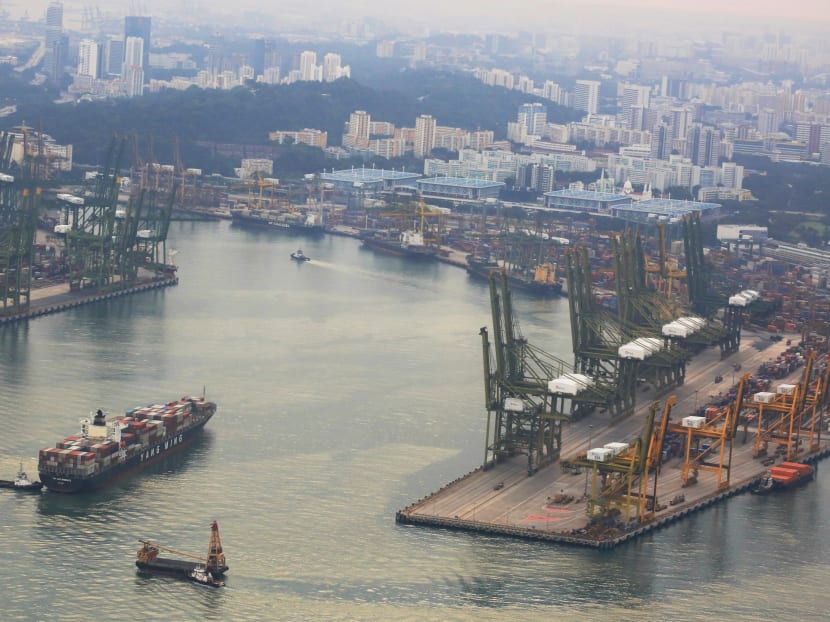Singapore shipping industry boosts efforts to meet emissions goals
SINGAPORE — Singapore’s maritime industry is stepping up efforts to reduce the environmental impact of shipping and related activities, ahead of the 2020 target that the International Maritime Organisation (IMO) has set for a 0.5 per cent global cap on sulphur emissions from marine fuels, from the current 3.5 per cent limit.
SINGAPORE — Singapore’s maritime industry is stepping up efforts to reduce the environmental impact of shipping and related activities, ahead of the 2020 target that the International Maritime Organisation (IMO) has set for a 0.5 per cent global cap on sulphur emissions from marine fuels, from the current 3.5 per cent limit.
A spokesperson from the Maritime and Port Authority (MPA) told TODAY that the carbon tax announced in Singapore’s Budget 2017 would not affect the marine industry as greenhouse gas emissions from international shipping are under the purview of IMO.
Among the raft of measures rolled out by the MPA under its green initiative, first announced in 2011 and extended last year to 2019, is the green energy scheme to adopt cleaner marine fuels, such as liquefied natural gas (LNG).
Until recently, the maritime industry has relied heavily on highly polluting fuel oil, a residual distillate of the crude oil refining process, according to Mr Francis Kan, who writes for MPA’s publication Singapore Nautilus.
“One large vessel in one day can emit more sulphur dioxide than all the new cars that come onto the world’s roads in a year. That is reason enough to cap emissions,” Mr Kan cited Mr Thomas Koniordos, head of business line environmental solutions at Norwegian chemical company Yara International, speaking on the sidelines of the 19th Singapore International Bunkering Conference and Exhibition in October last year.
“Domestically, sulphur oxide emissions is not an issue for Singapore as all harbour craft operating in the Port of Singapore use marine gas oil, which contains less than 0.5 per cent of sulphur,” said the MPA spokesperson.
“Our domestic maritime sulphur oxide emissions contribute just 1 per cent of Singapore’s sulphur oxide emissions, with land-based industrial emissions contributing the bulk.”
Mr Yaw Yan Chong, director of oil research in Asia at Thomson Reuters, however, cautioned that the 0.5 per cent cap on sulphur marine fuels is likely to drive up costs in the shipping industry, as there is insufficient production of clean fuel globally to feed the world’s marine industry’s consumption.
Coming at a time when the shipping industry is just picking up from the global downturn, this will have an adverse impact on the recovery of the maritime economy, said Mr Yaw.
“We are working closely with the MPA, bunker suppliers, oil majors and other stakeholders to ensure there will be sufficient low sulphur fuel to meet projected demand come 2020. We are also in discussion with the IMO to ensure details for implementing the 2020 sulphur cap are practical and implementable, and that shipowners will not be penalised for factors beyond their control,” said Mr Michael Phoon, executive director of the Singapore Shipping Association.
According to the MPA, more than half of new Singapore-registered ships are built to a higher energy efficiency design index than mandated by the IMO.
“Our green initiatives are largely incentive-based, and we have seen encouraging results.
“For example, under the green port programme, more ships calling at our port now use fuel containing less than 0.5 per cent sulphur to qualify for the flat rate of 25 per cent concession in port dues,” said the MPA spokesperson.
Ms Elaine Ng, transport and logistics tax partner at PwC Singapore, however, cautioned that while there has been a steady increase in ships being registered that meet or exceed the energy efficiency design index, “the question is whether the fee reductions and annual tonnage reductions are substantial enough to offset the costs of converting existing vessels to meet these new requirements, especially in the current cyclical downturn.” Rumi Hardasmalani







